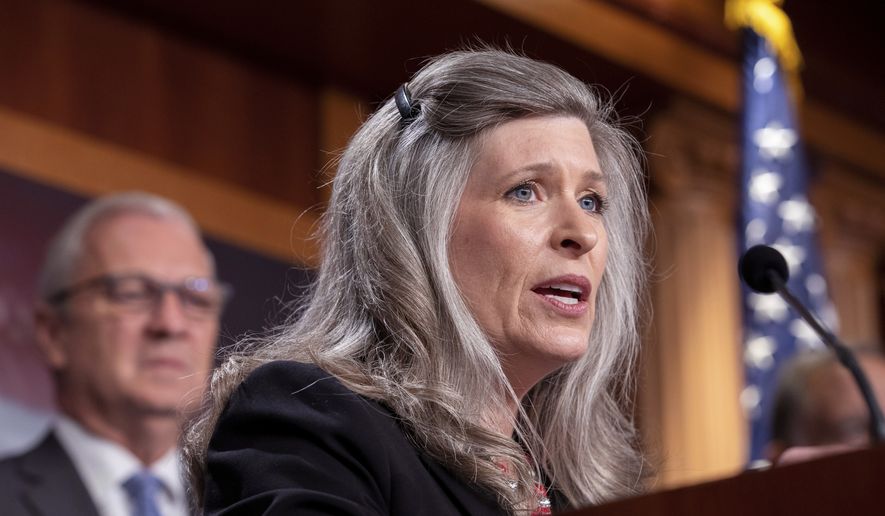The federal government’s coronavirus spending spree turned out to be a snow job — literally.
One Utah county spent more than $200,000 of its COVID-19 cash to make snow on a hill for sledding.
Auditors said Uintah County bought six snow guns at $20,000 each, along with snowcats and pipes, and paid $3,000 in shipping costs, all authorized by a single county commissioner. Local politicians told the Uintah Basin Standard they were coming up on a deadline to either use the cash or give it back to the state, so they needed a reason to spend. And they decided on snow.
Sen. Joni Ernst on Monday dedicated her December “Squeal Award,” which highlights ridiculous government waste, to Uintah and other state and local governments that found creative Christmas-style ways to waste COVID-19 money.
That includes Connecticut, where West Haven city officials spent federal coronavirus money on Christmas decorations.
The CT Mirror said Christmas wasn’t the only holiday city officials blessed with federal cash. They also rented a 20-person band to march in the Memorial Day parade with $7,000 of Uncle Sam’s money.
A local Republican politician eyeing the Democratic mayor’s seat told the CT Mirror the expenditures were “highly suspect.”
A West Haven city employee, who also served as the region’s member of the state House, was charged in a scheme that federal prosecutors say funneled hundreds of thousands of dollars in coronavirus money to a shell company he controlled.
Ms. Ernst said she hopes other fraudsters get the same treatment.
“I have a message for those even thinking of taking advantage of the financial support provided by the Coronavirus Aid, Relief, and Economic Security (CARES) Act for personal grift and graft: ‘You better watch out! I’m telling you why. Your days of playing Santa with taxpayer dollars are over, so don’t even try!’” the Iowa Republican said in her announcement of the Squeal Award.
The monthly award is named after Ms. Ernst’s famous 2014 Senate campaign ad in which she recounted her days as a girl on the family farm castrating pigs and vowed to make the big spenders in Washington “squeal” the same way.
On Capitol Hill, she has made a cottage industry of picking at spending scabs and exposing them with flair.
SEE ALSO: House GOP to investigate COVID unemployment cash going to China, Russia
Congress appropriated trillions of dollars to try to blunt the worst economic and social effects of the pandemic, pumping cash into unemployment checks and business payroll and health programs. Congress also allocated $500 billion directly to state and local governments for their own relief activities, according to the Committee for a Responsible Federal Budget’s COVID money tracker.
Members of Congress had said they were trying to help states plug budget gaps. But most states saw stronger-than-expected tax revenue despite the pandemic, and gaps were few. That meant state and local officials had to figure out other ways to use the federal money they’d been allocated.
Alabama officials have announced plans to use COVID-19 money to build new prisons. Wisconsin and Louisiana announced plans to boost struggling movie theaters.
A number of states used money to run tourism campaigns.
Auditors in local governments reported money allocated to holiday ornaments or bonuses to employees, both of which seemed at odds with the intention of the funds.
Ms. Ernst, in her Squeal Award, said at a time when Americans are facing soaring inflation and struggling to buy Christmas presents, it’s unseemly for governments to blow taxpayer dollars on boondoggles.
“There are too many struggling families and small business owners who are desperately trying to survive while untold amounts are being squandered because of inadequate guidance and oversight,” the senator said.
One of the COVID-19 projects Ms. Ernst exposed Monday involved plans by the town of Westfield, New Jersey, to buy 2,000 tote bags emblazoned with “Shop Local, Shop Safe, Shop Westfield.” The point was to encourage people to patronize local businesses struggling amid the pandemic during last year’s Christmas season.
But the bags weren’t actually distributed before Christmas.
Months later, they were discovered in unopened boxes in a warehouse, Ms. Ernst said.
For more information, visit The Washington Times COVID-19 resource page.
• Stephen Dinan can be reached at sdinan@washingtontimes.com.




Please read our comment policy before commenting.